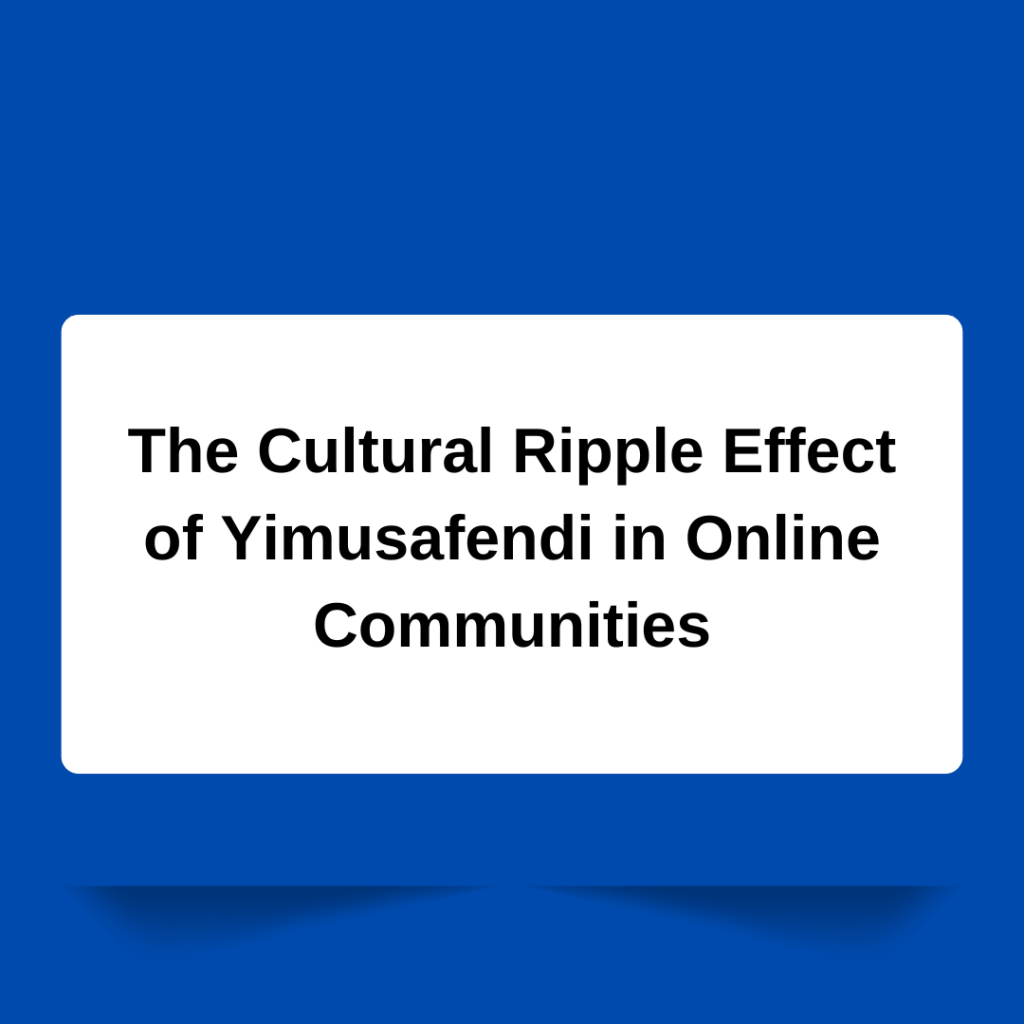In the ever-evolving landscape of digital culture, where memes rise and fall within hours and trends flicker like shooting stars, one word has captured the collective curiosity of the internet: Yimusafendi. Strange yet catchy, cryptic yet oddly familiar, this term has been popping up across social media threads, comment sections, and even Reddit conspiracy boards—leaving people around the world wondering: What is Yimusafendi, and why is everyone talking about it?
At first glance, “Yimusafendi” sounds like a name, perhaps of a person or a brand. Some speculate it’s the alias of an underground influencer, others say it’s an elaborate internet prank or a coded term born in obscure online communities. Regardless of its origin, the fascination is real—and growing. Much like viral phrases from the past that defy easy explanation but somehow worm their way into mainstream dialogue (think “OK Boomer” or “Cheugy”), Yimusafendi taps into that strange cultural space where irony, humor, and mystery collide.
But this isn’t just about another random word flooding TikTok or X (formerly Twitter). What sets Yimusafendi apart is its ability to spark genuine engagement. The phrase has taken on a life of its own, often used with a wink and a nudge, yet layered with meanings depending on who’s using it and in what context.
In this article, we’ll dive into the enigma of Yimusafendi—tracing its rise, decoding its possible origins, and exploring how it reflects broader trends in how we communicate online. If you’ve been scratching your head every time it pops up in your feed, you’re not alone. And by the end of this post, you’ll not only understand why Yimusafendi matters, but also why it might be the most internet thing ever.
How Yimusafendi Became an Internet Mystery No One Can Ignore

The internet is no stranger to mysterious trends, but few have baffled and intrigued netizens quite like Yimusafendi. One day, it wasn’t there—then suddenly, it was everywhere: YouTube comments, Reddit threads, Discord servers, and TikTok captions. Unlike the usual memes that explain themselves in an image or a catchphrase, Yimusafendi offered no context. It was just… there. And that absence of clarity is exactly what made it so addictive to chase. Everyone had a theory, and nobody could say for sure if they were right.
The First Sightings: Where Did Yimusafendi Come From?
The earliest mentions of Yimusafendi appeared in obscure internet forums and niche social media comments. Some users claim to have seen it as a username, others say it originated in Chinese internet culture, while a few believe it began as a bot-generated name that unexpectedly went viral. Despite conflicting origin stories, one thing became clear: the term had legs. And it didn’t need a clear definition to get people talking.
A Word That Feels Like a Riddle
What gives Yimusafendi its staying power is the way it straddles the line between nonsense and significance. Phonetically, it sounds like a name or phrase from another language. That ambiguity is part of the appeal—it invites interpretation. People began joking that Yimusafendi was an “ancient code,” a forgotten celebrity, or even an AI overlord watching us through our screens. The more absurd the theories became, the more entertaining it was to be part of the inside joke.
The Meme Without a Manual
Unlike most memes that come with an obvious visual or punchline, Yimusafendi became a meme by simply existing. Users inserted it into unrelated conversations to confuse others, much like how “cheese touch” or “ligma” once disrupted group chats. It’s a digital prank and a linguistic puzzle rolled into one. The randomness is the joke—but the community around it gives it life.
Community Fuel: Why People Can’t Stop Using It
Communities on TikTok and Reddit began creating their own lore around Yimusafendi. It evolved from a simple word into a kind of blank canvas, allowing users to assign it whatever meaning they wanted. In this way, it became more than a meme—it became a participatory game. You weren’t just laughing at Yimusafendi, you were contributing to its mythos.
The Curiosity Loop That Keeps the Word Alive
Part of Yimusafendi’s power lies in how it triggers curiosity. People see the word, don’t understand it, and feel compelled to investigate. But there’s no real answer, and that frustration only leads them to use it more—sometimes sarcastically, sometimes sincerely. The mystery becomes the marketing. It’s a self-sustaining loop that fuels its own popularity.
Could Yimusafendi Be an Experiment?
As theories grew more elaborate, some suggested that Yimusafendi might be a social experiment—perhaps even an AI-generated phrase designed to test how language spreads. While there’s no solid evidence behind these claims, they add a sci-fi layer of intrigue that only makes people more obsessed. In a digital world filled with algorithms and bots, who’s to say it’s not possible?
Language Evolution in Real-Time
In a sense, Yimusafendi is a case study in how language evolves online. It shows how a meaningless term can gain traction through repetition, humor, and collective engagement. In a way, it mirrors how slang terms, idioms, and even brand names have historically entered mainstream culture—just accelerated by the speed of the internet.
Why Yimusafendi Might Stick Around
Most memes fade as fast as they rise, but Yimusafendi seems to have more staying power than usual. Why? Because it doesn’t rely on a single format or trend. It’s not tied to a pop culture reference, a movie, or a celebrity. It exists independently, adaptable to whatever context people place it in.
The Joy of the Unknown
Ultimately, the rise of Yimusafendi reminds us of what makes the internet such a uniquely human space: our desire to connect through shared mystery, humor, and meaning-making. Whether it started as a random username, an internet prank, or something even stranger, it has turned into a cultural moment that reflects our need to play, laugh, and belong—even if it’s just over a single, unexplainable word.
The Cultural Ripple Effect of Yimusafendi in Online Communities

In a digital world flooded with fleeting trends and catchy buzzwords, few terms have generated as much curiosity and conversation as Yimusafendi. It’s strange, it’s memorable, and above all—it seems to mean something different depending on who you ask. While at first glance it might look like just another internet oddity, Yimusafendi has actually sparked meaningful engagement across online communities, revealing the internet’s unmatched power to shape language, humor, and even identity.
From Curiosity to Cultural Marker
What began as a seemingly nonsensical word quickly turned into something more profound. Forums like Reddit, Twitter, and Discord became the breeding ground for interpretation, parody, and inside jokes centered around Yimusafendi. Within weeks, the word went from a confused “What is this?” to a shared symbol used to mark inclusion, irony, and even mild rebellion against online seriousness. It has effectively evolved from being a question to a statement—a kind of digital badge that only “those who know” truly understand.
Language That Connects, Not Confuses
Language on the internet is constantly in flux. What makes Yimusafendi particularly fascinating is that it doesn’t come with an official meaning—and that’s exactly why it works. In communities where inside jokes, cryptic messages, and shared confusion foster a sense of belonging, a word like Yimusafendi becomes a tool. It connects strangers through irony, randomness, and the shared experience of asking, “What does this even mean?”
A Tool for Memes and Messaging
As with most internet phenomena, Yimusafendi quickly found its way into meme culture. Whether it was edited into images, used in absurd mock-philosophical quotes, or dropped casually into comment sections, its flexibility made it a perfect meme ingredient. Creators have used it as a placeholder for everything from existential dread to exaggerated confidence—making it both funny and oddly relatable.
Digital Identity Through Absurdity
What does it say about us that we bond over a word like Yimusafendi? For many, it’s not about what the word actually means but how it feels to be part of something undefined. In online communities where identity is fluid and self-expression often leans into surrealism, Yimusafendi acts like a mirror. People see in it what they want—and that says a lot about the diversity of modern internet culture.
Subcultures Driving the Narrative
Some of the strongest traction for Yimusafendi has come from niche online groups. Tech forums, gaming channels, and even cryptocurrency spaces have picked up the word and run with it—often giving it their own flavor. In one subreddit, it might symbolize irony; in another, it’s a metaphor for disruption. This multiplicity has only made the term more viral and harder to define, further fueling its appeal.
Humor That’s Lost in Translation—But That’s the Point
One reason Yimusafendi has spread so fast is because of its built-in ambiguity. Humor thrives in uncertain terrain, and this word is a perfect example. It defies logic and yet inspires laughter. It sounds like it should mean something—but it doesn’t. That absurdity is the joke, and for many digital natives, that’s more meaningful than a dictionary definition ever could be.
The Rise of Semantic Chaos Online
In a world dominated by algorithms and search engines, Yimusafendi is delightfully defiant. It doesn’t perform well in Google results (at least not initially), it can’t be easily monetized, and it doesn’t conform to standard SEO. And yet, it thrives—precisely because users want content and language that feels raw, unpredictable, and free from the overly polished digital experience they’re used to.
More Than a Word: A Shared Experience
At its core, Yimusafendi isn’t just a word—it’s an experience. It represents how quickly internet users can build collective meaning around something that starts as nonsense. It shows how humor, confusion, and community come together to give life to language. In that sense, it’s more than a meme; it’s a social experiment playing out in real time.
Where Does It Go From Here?
Like all viral moments, the future of Yimusafendi is uncertain. It may fade into obscurity, become co-opted by brands (which rarely ends well), or solidify its place in internet folklore. But no matter what happens next, its cultural ripple effect has already been felt. In a fragmented digital world, Yimusafendi gave people something to gather around—even if no one could explain exactly why.
Is Yimusafendi Just a Meme—or Something Much Bigger?
In that wild ecosystem, the word “Yimusafendi” has sprouted out of seemingly nowhere. With no obvious origin and no official definition, it’s been embraced by users on Reddit, TikTok, YouTube, and niche forums alike. And despite—or maybe because of—its ambiguity, people can’t stop sharing it, repeating it, and building stories around it. That alone signals it might be more than just another meme.
Viral Trends Often Fade—But Yimusafendi Is Sticking Around
Unlike typical viral catchphrases that burn out after a few days, Yimusafendi continues to circulate. It has staying power. Whether it’s being used sarcastically, humorously, or even cryptically, it appears in comment threads with increasing frequency. This suggests that users are resonating with something deeper—something that goes beyond just a fleeting joke. It’s become a kind of placeholder for irony, confusion, or even cultural commentary.
The Meme That Defies Meaning
Memes usually carry some form of cultural shorthand—some shared understanding or recognizable context. Yimusafendi breaks that mold. People use it in a wide range of situations: to express sarcasm, to confuse others on purpose, or simply to sound cool and in-the-know. That lack of consistent meaning might actually be what’s making it so powerful. It’s flexible, strange, and open to interpretation—everything a modern meme thrives on.
An Internet In-Joke for the Masses
There’s a special kind of humor that exists only online—layered in irony and often inaccessible to outsiders. Yimusafendi fits that perfectly. It’s the kind of phrase you post to see who reacts, who’s confused, and who replies with another inside joke. This behavior builds a kind of invisible community—people who get it, and people who don’t. And when a word becomes a gatekeeper for that kind of participation, it becomes more than just a joke.
The Psychology Behind the Obsession
Part of what makes Yimusafendi intriguing is how it plays with our need for understanding. Humans naturally want to make sense of words, especially ones that seem important or repeated. When something like Yimusafendi defies explanation, our brains treat it like a riddle. And when the internet collectively embraces that confusion, it becomes a shared experience—one that can even build emotional attachment, oddly enough.
Is It a Meme, or Is It a Movement?
There’s a line between internet trends and digital subcultures. Yimusafendi might be crossing that line. It’s not just being used as a joke—it’s being turned into art, user handles, merchandise, and full-blown theories. People are owning it. That level of engagement is often the first signal that a meme is transforming into a larger cultural moment.
The Role of Anonymity in Amplifying Yimusafendi
Because there’s no known face or brand behind the word, users feel free to redefine it over and over. Anonymity fuels creativity and absurdity on the internet, and with Yimusafendi, it has given people room to explore, remix, and evolve the term without boundaries. Without a central “owner” of the phrase, it belongs to everyone—and that makes it even more viral.
Digital Linguistics: A New Internet Language?
Yimusafendi could be seen as a case study in the birth of a new kind of internet language. Much like how emojis, acronyms, and phrases like “LOL” or “YOLO” shaped online communication, this term may represent a new layer of playful, culturally coded language. It’s less about definition and more about shared emotional context. You feel it more than you understand it—and that’s a fascinating linguistic shift.
Why People Love Not Knowing
There’s a comfort in mystery that the internet loves to indulge in. From ARGs (alternate reality games) to cryptic accounts, people love a good rabbit hole. Yimusafendi is just mysterious enough to invite speculation without leading to any real answers—and that makes it fun. The more users question it, the more attention it gets, creating a feedback loop of curiosity.
The Meme with a Mind of Its Own
So, is Yimusafendi just a meme? Technically, yes. But it’s also a symbol—of modern internet culture, of digital irony, of collective identity built on ambiguity. Its power lies in its vagueness and its potential. It’s not the first weird internet word to catch fire, and it won’t be the last, but its growing momentum suggests it may become something more permanent. Whatever it becomes, one thing’s certain: we haven’t seen the last of Yimusafendi.
| Attribute | Description |
|---|---|
| Keyword | Yimusafendi |
| Pronunciation | yee-moo-sah-fen-dee (commonly assumed, not confirmed) |
| Category | Internet trend / meme / viral keyword |
| Origin | Unknown (speculated to be from Reddit, TikTok, or user-generated content) |
| First Known Use | Circulated widely online in late 2023 – early 2024 |
| Meaning | Undefined; used humorously, ironically, or cryptically |
| Common Use Cases | Memes, usernames, comments, cryptic replies, forum discussions |
| Cultural Role | Symbol of digital absurdity and community-based humor |
| Associated Platforms | TikTok, Reddit, Twitter (X), YouTube, Discord |
| Potential Future Use | Brandable term, internet slang, meme identity, or inside-joke culture |
Conclusion
Yimusafendi may have started as a curious blip on the internet’s radar, but it has quickly evolved into something far more intriguing. It’s not just a random word—it’s a symbol of the way digital culture thrives on mystery, humor, and shared experiences that defy easy explanation. Whether it’s used to confuse, amuse, or build a sense of insider identity, Yimusafendi taps into the collective mindset of the online world in a uniquely powerful way.
What makes it special isn’t a clear meaning, but the fact that it doesn’t need one. It’s a mirror of modern internet behavior—where absurdity is embraced, context is fluid, and a single word can become a viral force. As digital communities continue to grow and morph, it’s terms like Yimusafendi that remind us how language, culture, and connection are being reshaped in real time.
So, is Yimusafendi just a meme? Maybe. But judging by its staying power and cultural impact, it’s safe to say it’s something much bigger. And in a world that runs on engagement and emotion, that might be all it needs to matter.
1. What is the meaning behind the word Yimusafendi?
Yimusafendi is a mysterious term with no fixed definition. It’s mostly used online as a playful or ironic expression, often sparking curiosity because it doesn’t fit traditional language rules. Its meaning changes depending on the context, making it a flexible digital trend.
2. How did Yimusafendi become popular on the internet?
Yimusafendi gained traction through social media platforms where users started sharing it as a meme or inside joke. Its origin is unclear, but the word’s unique sound and cryptic nature helped it spread quickly across communities like TikTok, Reddit, and Twitter.
3. Is Yimusafendi just a passing internet fad?
While many viral words fade fast, Yimusafendi’s continued presence hints it might be more than a fad. Its open-ended meaning allows users to keep reinventing it, which helps it stay relevant and keeps conversations around it alive longer than typical memes.
4. Why do people use Yimusafendi in online conversations?
People use Yimusafendi to add humor, mystery, or a sense of belonging to online chats. Since it has no strict meaning, it can act as a fun inside joke or a way to playfully confuse others, making interactions more engaging and lighthearted.
5. Could Yimusafendi become a permanent part of internet slang?
It’s possible. Many viral terms start as jokes but eventually become woven into everyday online language. If Yimusafendi continues to grow in popularity and adaptability, it might become a recognized slang term embraced by diverse online communities.


